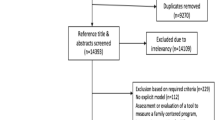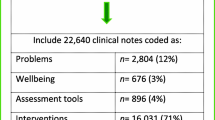Abstract
The aim of this study was to explore the current practices of primary care physicians (PCPs) in providing bereavement care to elderly patients, with implications for medical education. A total of 63 PCPs answered a brief online survey about their typical practices, barriers, comfort level with bereavement, and confidence in their ability to diagnose prolonged grief disorder (PGD). They were recruited through an online newsletter and contacts of one of the authors. The results found that two-thirds of the PCPs do not routinely screen their elderly patients for recent losses, nor do they refer to mental health clinicians when loss is identified. Barriers included not learning of the deaths in patients’ lives and lack of time during clinic visits. Those PCPs who had experienced their own losses were significantly more comfortable in speaking to patients about recent losses and more confident in their ability to diagnose PGD. We recommend bereavement education be incorporated into the medical school curriculum from the outset, utilizing the psychological principle of graded exposure to bereaved individuals.
Similar content being viewed by others
References
Agnew, A., Manktelow, R., Taylor, B. J., & Jones, L. (2010). Bereavement needs assessment in specialist palliative care: A review of the literature. Palliative Medicine, 24, 46–59.
American Geriatrics Society Core Writing Group of the Task Force on the Future of Geriatric Medicine. (2005). Caring for older Americans: The future of geriatric medicine. Journal of the American Geriatrics Society, 53, S245–S256.
Bennett, K. M. (1997). Widowhood in elderly women: The medium- and long-term effects on mental and physical health. Mortality, 2, 137–148.
Bergman, E., & Haley, W. E. (2009). Depressive symptoms, social network, and bereavement service utilization and preferences among spouses of former hospice patients. Journal of Palliative Medicine, 12, 170–176.
Billings, J. A., & Block, S. (1997). Palliative care in undergraduate medical education: Status report and future directions. The Journal of the American Medical Association, 278, 733–738.
Billings, J. A., Block, S. D., Finn, J. W., LeGrand, S. B., Lupu, D., Munger, B., … von Gunten, C. F. (2002). Initial voluntary program standard for fellowship training in palliative medicine. Journal of Palliative Medicine, 5, 23–33.
Billings, M. E., Engelberg, R., Curtis, J. R., Block, S., & Sullivan, A. M. (2010). Determinants of medical students’ perceived preparation to perform end-of-life care, quality of end-of-life care education, and attitudes toward end-of-life care. Journal of Palliative Medicine, 13, 319–326.
Cartwright, A. (1982). The role of the general practitioner in helping the elderly widowed. Journal of the Royal College of General Practitioners, 32, 215–227.
Case, A. A., Orrange, S. M., & Weissman, D. E. (2013). Palliative medicine physician education in the United States: A historical review. Journal of Palliative Medicine, 16, 230–236.
Caserta, M. S., & Lund, D. A. (1992). Bereaved older adults who seek early professional help. Death Studies, 16, 17–30.
Cherlin, E. J., Barry, C. L., Prigerson, H. G., Schulman-Green, D., Johnson-Hurzeler, R., Kasl, S. V., & Bradley, E. H. (2007). Bereavement services for family caregivers: How often used, why, and why not? Journal of Palliative medicine, 10, 148–158.
Ghesquiere, A. R., Patel, S. R., Kaplan, D. B., & Bruce, M. L. (2014). Primary care providers’ bereavement care practices: Recommendations for research directions. International Journal of Geriatric Psychiatry, 29, 1221–1229.
Guldin, M. B., Jensen, A. B., Zachariae, R., & Vedsted, P. (2013). Healthcare utilization of bereaved relatives of patients who died from cancer: A national population-based study. Psycho-Oncology, 22, 1152–1158.
Haley, W. E., Larson, D. G., Kasl-Godley, J., Neimeyer, R. A., & Kwilosz, D. M. (2003). Roles for psychologists in end-of-life care: Emerging models of practice. Professional Psychology: Research and Practice, 34, 626–633.
Hansson, R. O., & Stroebe, M. S. (2007). Bereavement in late life: Coping, adaptation, and developmental influences. Washington, DC: American Psychological Association.
Harris, T., & Kendrick, T. (1998). Bereavement care in general practice: A survey in South Thames Health Region. British Journal of General Practice, 46, 1560–1564.
Institute of Medicine. (2008). Retooling for an aging America: Building the health care workforce. Washington, DC: The National Academies Press.
Leipzig, R. M., Granville, L., Simpson, D., Anderson, M. B., Sauvigne, K., & Soriano, R. P. (2009). Keeping granny safe on July 1: A consensus on minimum geriatrics competencies for graduating medical students. Academic Medicine, 84, 604–610.
Lemkau, J. P., Mann, B., Little, D., Whitecar, P., Hershberger, P., & Schumm, J. A. (2000). A Questionnaire survey of family practice physicians’ perceptions of bereavement care. Archives of Family Medicine, 9, 822–829.
Leung, W. C. (2002). Competency based medical training: Review. British Medical Journal, 325, 693–696.
Low, J., Cloherty, M., Wilkinson, S., Barclay, S., & Hibble, A. (2006). A UK-wide postal survey to evaluate palliative care education amongst general practice registrars. Palliative Medicine, 20, 463–469.
Lundorff, M., Holmgren, H., Zachariae, R., & Farver-Vestergaard, I. (2017). Prevalence of prolonged grief disorder in adult bereavement: A systematic review and meta-analysis. Journal of Affective Disorders, 212, 138–149.
Morris, S. E., & Block, S. D. (2012). Grief and bereavement. In L. Grassi & M. Riba (Eds.), Clinical psycho-oncology: An international perspective (pp. 271–280). West Sussex: Wiley-Blackwell.
Morris, S. E., & Block, S. D. (2015). Adding value to palliative care services: The development of an institutional bereavement program. Journal of Palliative Medicine, 18, 915–922.
Nagraj, S., & Barclay, S. (2011). Bereavement care in primary care: A systematic literature review and narrative synthesis. British Journal of General Practice, 61, e42–e48.
National Consensus Project for Quality Palliative Care. (2013). Clinical practice guidelines for quality palliative care (3rd ed.). Pittsburgh: NCP.
National Hospice and Palliative Care Organization. (2008). Guidelines for bereavement care in hospice. Alexandria: NHPCO.
Neugarten, B. (1979). Time, age, and the life cycle. The American Journal of Psychiatry, 136, 887–894.
Nicholas, J. A., & Hall, W. J. (2011). Screening and preventive services for older adults. Mount Sinai Journal of Medicine, 78, 498–508.
Norris, F. H., & Murrell, S. A. (1990). Social support, life events, and stress as modifiers of adjustment to bereavement by older adults. Psychology and Aging, 5, 429–436.
O’Connor, M., & Breen, L. J. (2014). General practitioners’ experiences of bereavement care and their educational support needs: A qualitative study. BMC Medical Education, 14, 59.
Prigerson, H. G., Horowitz, M. J., Jacobs, S. C., Parkes, C. M., Aslan, M., Goodkin, K., … Maciejewski, P. K. (2009). Prolonged grief disorder: Psychometric validation of criteria proposed for DSM-5 and ICD-11. PLoS Med, 6, e10000121.
Prigerson, H. G., & Jacobs, S. C. (2001). Caring for bereaved patients—All the doctors just suddenly go. Journal of the American Medical Association, 286, 1369–1376.
Saucier, D., Shaw, E., Kerr, J., Konkin, J., Oandasan, I., Organek, A. J. … Walsh, A. E. (2012). Competency-based curriculum in family medicine. Canadian Family Physician, 58, 707–708.
Schaefer, K. G., Chittenden, E. H., Sullivan, A. M., Periyakoil, V. S., Morrison, L. J., Carey, E. C., … Block, S. D. (2014). Raising the bar for the care of seriously ill patients: Results of a national survey to define essential palliative care competencies for medical students and residents. Academic Medicine, 89, 1024–1031.
Segal, D. L., Qualls, S. H., & Smyer, M. A. (2011). Aging and mental health. West Sussex: Wiley-Blackwell.
Shah, S. N., & Meeks, S. (2012). Late-life bereavement and complicated grief: A proposed comprehensive framework. Aging & Mental Health, 16, 39–56.
Shear, M. K. (2015). Complicated grief. New England Journal of Medicine, 372, 153–160.
Shear, M. K., Reynolds, C. F., Simon, N. M., Zisook, S., Wang, Y. J., Mauro, C., … Skritskaya, N. (2016). Optimizing treatment of complicated grief: A randomized clinical trial. JAMA Psychiatry, 73, 685–694.
Stroebe, M., Schut, H., & Stroebe, W. (2007). Health outcomes of bereavement. Lancet, 370, 1960–1973.
VandenBos, G. R. (Ed.). (2007). APA dictionary of psychology. Washington, DC: American Psychological Association.
von Gunten, C. F., Mullan, P., Nelesen, R. A., Soskins, M., Savoia, M., Buckholz, G., & Weissman, D. E. (2012). Development and evaluation of a palliative medicine curriculum for third-year medical students. Journal of Palliative Medicine, 15, 1198–1206.
Acknowledgements
The authors would like to thank the American College of Physicians for running the survey in their e-newsletter and to the physicians who participated in the study, which was conducted by Dr. Morris in partial fulfillment of her Doctorate degree at William James College, Newton, MA. The authors would also like to thank Dr. Laurel Wainwright for her help with analyzing the data and Dr. Shyamala Venkataraman for her guidance throughout the study.
Author information
Authors and Affiliations
Corresponding author
Ethics declarations
Conflict of interest
Sue Morris, Kristen Schaefer, and Erlene Rosowsky declare that they have no conflict of interest.
Human and animal rights and Informed consent
All procedures were in accordance with the ethical standards of the institutional research committees and with the 1964 Helsinki declaration and its later amendments or comparable ethical standards. Informed consent was obtained from all individual participants included in the study.
Rights and permissions
About this article
Cite this article
Morris, S., Schaefer, K. & Rosowsky, E. Primary Care for the Elderly Bereaved: Recommendations for Medical Education. J Clin Psychol Med Settings 25, 463–470 (2018). https://doi.org/10.1007/s10880-018-9556-9
Published:
Issue Date:
DOI: https://doi.org/10.1007/s10880-018-9556-9




